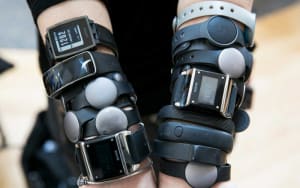


We live in a world where almost anything can be tracked, and nearly everything is measured and quantified. We measure our progress professionally: We try to quantify our productivity at work, we track sales, measure customer satisfaction, and quantify everything from social media likes to airline miles, and credit card points. And now we live in a world where our health, or perceived health, is quantified from every heartbeat and step taken to calorie burned and minute spent in a REM state of sleep is tallied and calculated to tell us more about our well-being. However, quantifying health habits are a bit troublesome to me. Here’s why:
Exercise, something that should be done for enjoyment and the betterment of life, now has millions of people extrapolating data and relying on the number of steps they have taken or calories they have burned to TELL them when to exercise. We are losing the ability to trust our body and the bio-feedback it gives us. Working out feels good and should be something we WANT to do, not a task we feel we have to check off every day or need to compete with our friends via an app to get more steps. Your body will naturally give you feedback when you have had a good workout and are making progress: sore muscles, a release of endorphins, and an accelerated focus. Our bodies feel healthier and more energized and our clothes may even start to fit better. We also know when we have had a poor night’s sleep because we feel exhausted, have a lack of focus, and do not possess the clarity of mind we might have otherwise. Just like I don't need an app to tell me I had a poor or great night’s sleep, my body is capable of telling my mind what it needs and vice-versa.
Having an app tell me how many more steps I need to surpass a friend or to meet 10,000 steps has the potential to turn something that has immense enjoyment potential into a chore that becomes monotonous and tedious. This can also turn working out into an unhealthy addiction or obsession, causing us to over-exercise or take harmful supplements to burn more calories. Obsession can also cause us to partake in ultra-low-calorie diets that can lead to unhealthy outcomes and long-term damage to our hormone levels, muscle mass, digestion, fertility, and can cause essential nutrient deficiencies ultimately crippling our long term-health. In fact Duke University Fuqua School of Business Professor, Jordan Etkin published a study (found here) that found measuring self-quantifiable activities like fitness through wearable devices could actually lead to those activities being less enjoyable. Etkin says, “Measurement’s unintended harmful effects can thus extend beyond decreasing an activity’s enjoyment to reducing subjective well-being.” Etkin goes on to say, “Rather than merely drawing attention away from an enjoyable activity, measurement also draws attention towards output, which undermines motivation and overall happiness.”
There is also debate as to how accurate any of these tracker or wearable devices actually are. Given that they depend on limited metrics, like body weight, age, and heart rate, there is only so much information that can accurately be given. Our overall health and fitness levels are not this limited or black and white. For starters, not all calories are created equal, and your body, in fact, metabolizes them very differently. Furthermore, not all exercise is created equal: Function, form and intensity all play a role in the efficacy of a workout. There is more to working out than just tracking single variables, such as movement. Additionally, most wearable devices don't quantify the quality of your movement. Thus, a night of binge eating is not canceled out by running up and down the stairs to burn more calories. Many variables exist, from lifestyle, genetics, sleep, and hormone levels, that determine our body’s ability be fit, lose weight. Putting all of your trust in wearable fitness technology should be done with an understanding that these devices have very limited accuracy and are many times not indicative of reality.
Now I'm not saying that we need to throw out our wearable fitness devices or never track our progress or that there aren’t valid reasons for some to track their heart rate during a workout. It is true that many wearable devices have given those who may not have otherwise been interested in or motivated to exercise, a reason to do so. Nor am I saying that we shouldn’t set goals for ourselves when working out. Striving to lift heavier or run faster are great goals! Seeking constant improvement and big picture progress matters, and we absolutely should be setting measurable goals for ourselves!
What I am advocating is that we need to learn to more frequently self-assess and track our result from the inside out. Rather than obsess about recording calories and grams of fat, strive to eat healthy and wholesome and then pay attention to how you FEEL a couple of hours later. Are you more energized? Do you feel bloated? Learning to listen to our bodies is crucial to achieving long-term health and not short-term success dictated by burning calories or getting more steps. Paying attention to the increased stamina one may have after playing with their grandkids when they would have normally been fatigued before beginning a workout regimen is more indicative of progress made than the number of calories burned in a day.
If you are looking to start a health and fitness related new year resolution and were planning to use a wearable fitness devices to measure your goals…you may want to rethink what it is that can motivate you long term. Perhaps think about finding a gym or fitness facility that can teach you a new and enjoyable skill. If you find your workout to be boring and monotonous, expand your horizons and take a class with a friend or learn a skill-based activity like rock climbing or martial arts or self-defense. Training in Krav Maga and other self-defense based skills is how I have continued to find enjoyment and long term fulfillment in my workout routines. If self-defense is something that interest you I would of course welcome you to join me for a class to see how you can get safer and stronger though Krav Maga. But, whatever you choose, be sure to track your result and assess how you feel before tracking your steps!
Chantell is a Certified Personal Trainer and Behavior Change Specialist through the National Academy of Sports Medicine, as well as a certified suspension trainer, and Krav Maga/Defensive Options Fit To Fight Instructor. Chantell enjoys training across various specialties as an athlete and student for 20 plus years and has spent the last decade immersed in the health and fitness industry in her pursuit to bring the benefits of exercise and fitness to others.

Last month, I was only going to sign up my 12 year old son but decided to sign up after taking an introductory class. Every class is different and I am learning something new each time. Chantell and Ehren are awesome trainers that push us to do our best. I would definitely recommend Krav Oz LLC to my family and friends!

I took a Women's Self Defense class with Chantell in July and instantly felt a need to continue. A few days later I signed a 12 month contract. I can't believe how far I've come since day one. Chantell and Ehren are amazing instructors. They are so passionate about what they do. Every class is better than the last. I’m constantly talking about my training with my friends and family. I would highly recommend Krav Oz LLC. I don’t know how they do it but I leave every class with a huge smile on my face. Thank you, Chantell and Ehren!

I recently attended Krav Oz's Self Defense seminar in Rockville - and it was fantastic! A comprehensive four hours covering everything I could want, and at just the right speed to keep me and the other attendees challenged and engaged. From start to finish, Chantell and Ehren provided excellent instruction; without sacrificing the skill and passion they possess for their field, Chantell and Ehren created an encouraging and stimulating environment fueled by real life, practical examples in the lecture portion, and helpful analogies to make the defense moves in the self-defense portion hit home (pun intended). In short, this seminar was one from which all could benefit - whether you've never heard of Krav Maga, or have spent years on the mats. Can't wait to come check out a class!